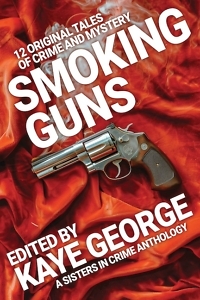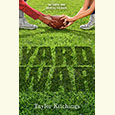Sinister Stories
Smoking Guns delivers a dozen tales of murder and more
Smoking Guns, an anthology from the East Tennessee chapter of Sisters in Crime, offers a dozen “original tales of crime and mystery” that take readers into the dark corners of humanity. The writers, with backgrounds ranging from newsrooms to the C.I.A. to underwater naturalist education, share sinister stories of murder, poisoning, theft, stalking, and violent jealousy.
 “Just Beneath,” a story by Patrick Connolly, a former reporter and editor at The Tennessean, takes place on a family farm located south of Nashville. Connolly’s outstanding story involves a loyal granddaughter named Lily who takes on the responsibilities of the family farm when her grandparents are no longer able to care for it. But her ambivalence about the work causes her to question her place on the farm and eventually leads to a decision to transform the land into a retreat center. As soon as ground is broken for Lily’s grand idea, the plan comes to a halt when human remains are found buried in the soil her family tilled for generations. The unnerving discovery and subsequent search for answers force Lily to confront a gruesome family secret.
“Just Beneath,” a story by Patrick Connolly, a former reporter and editor at The Tennessean, takes place on a family farm located south of Nashville. Connolly’s outstanding story involves a loyal granddaughter named Lily who takes on the responsibilities of the family farm when her grandparents are no longer able to care for it. But her ambivalence about the work causes her to question her place on the farm and eventually leads to a decision to transform the land into a retreat center. As soon as ground is broken for Lily’s grand idea, the plan comes to a halt when human remains are found buried in the soil her family tilled for generations. The unnerving discovery and subsequent search for answers force Lily to confront a gruesome family secret.
After reading a couple of stories from Smoking Guns, I began to speculate about what type of crime might be explored in the next. Would it be a heinous crime that instantly ruins someone’s life or one less harmful but still damaging in unexpected ways? The anthology features plenty of murder but also stories like “Bet You’re Wrong” by Robert Mangeot, which explores the dark side of technology through a character obsessed with credit card scams. One strength of this collection is that it introduces readers like me, who don’t frequent the genre, to a variety of crime writing and demonstrates the many ways crime can be featured in the short story form.
The stories in Smoking Guns take place in a wide variety of settings, from family farms to community theaters to retail stores. One of my favorites, “Fences, Neighbors, and a Gun” by Kaye George, who also edited the anthology, intrigued me with its domestic depravity. When a tree falls on an elderly’s woman’s yard and lands on a neighbor’s fence, a dispute over the cost of the damage escalates to a chilling level. Told through the eyes of Flo, a neighborhood gossip who walks the streets with her Yorkipoo collecting information from neighbors, the story unfolds after a court case regarding the fallen tree. Despite the judge’s ruling, the conflict spirals out of control when neighbors retaliate against one another in unexpected ways.
You’ll encounter a range of writing skill, style, and sophistication in Smoking Guns. This reflects the mission of Sisters in Crime, a national organization providing a big tent to nurture crime writers of all stripes from across the United States. Readers seeking polished prose in every story might be turned off by the variability, but I enjoyed the gritty mixture of styles.
My hope is that the collection finds its way into the hands of both those with an appetite for crime writing and those who might not know what they’ve been missing. As someone who has overdosed on true crime documentaries across multiple streaming services, I appreciate Smoking Guns showing me not only the potential of crime writing but how to do it with a more nuanced approach.
These are good reasons to read Smoking Guns, but I don’t want to overlook another one: It’s fun. Spending time exploring the dark side of humanity and taking note of the worst that people can do to one another is fascinating. How awful can we be? What are the limits of our depravity? And am I capable of such things too?

Billy Kilgore is a writer, at-home dad, and ordained pastor. He lives with his wife and two sons in Nashville. His writing has appeared in The Washington Post’s “On Parenting” column, Narratively, Scary Mommy, and Fatherly. He is a graduate of the University of Tennessee at Chattanooga.


